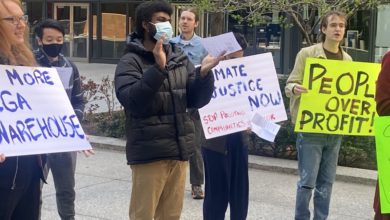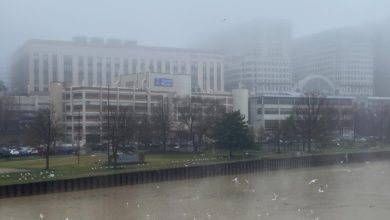September 8 was a global day of action for climate justice groups and activists, scheduled ahead of the ‘Global Climate Action Summit’ that will take place in San Francisco from September 12-14.
The summit, initiated by California Governor Jerry Brown, is billed as providing “states and regions, cities, companies, investors and civil society” a platform to make commitments directed towards the goals outlined in the 2015 Paris climate agreement by the United Nations Framework Convention on Climate Change.
Paris saw many thousands hit the streets on Sept. 8, and 30,000 people marched in San Francisco in the grassroots-organized “Rise for Climate, Jobs & Justice” demonstration to kick-off a week of action surrounding the summit.
Framing the issue as one requiring immediate transformative change, demands of the September 8 San Francisco action directed Governor Brown to immediately stop the approval of any new fossil fuel projects and to begin a just transition to 100 percent renewable energy.
Campaigns such as “Brown’s Last Chance” have recognized the glaring fact that in California, “Under Governor Brown’s administration, state oil regulators have issued more than 20,000 drilling permits for dirty oil and gas wells. Kern County, America’s largest oil-producing county, has projected the development of 2,697 new wells per year for the next 20 years and beyond.” Brown is also known to have accepted millions of dollars in campaign contributions from the fossil-fuel industry.
An Indigenous people’s contingent led the San Francisco march, with broad contingents of labor, youth and students, anti-racist organizations, and various social and environmental justice groups following towards Civic Center Plaza in front of City Hall, which was surrounded by activists painting large-scale street murals. Two “moments of solidarity” throughout the day were coordinated to remind participants of their connection with each other and the Earth. At the end of the march was a Resource Fair for organizations to set up and spread their message.
The case for system change, not climate change
In the march, The Party for Socialism and Liberation initiated a socialist contingent under a banner reading “Climate Change is the Symptom, Capitalism is the Disease, Socialism is the Cure.” PSL comrades identified the Pentagon as the world’s biggest polluter, with its war drive to conquer the oil of other nations from Iraq to Venezuela as a pressing issue of the climate movement. That very day an article had appeared in the New York Times revealing that the Trump administration met with counter-revolutionaries inside the Venezuelan military to help plot the overthrow of President Nicolas Maduro. Venezuela is known to hold the world’s largest oil reserves.
Also raised in the contingent was the campaign to pass California’s Proposition 10, which will appear on the November 6 ballot as the Affordable Housing Act. The passage of Proposition 10 would restore the right of communities in California to pass stronger rent control and temper the severe housing crisis.
The same poor and working class people in the U.S. most vulnerable to losing their housing from predatory housing policies are among the same people put most at risk by climate change, pollution, and reckless environmental practices by their local, regional, and federal governments.
How do the political stewards of “climate leadership” at the Global Climate Action Summit reconcile the fact that people are sleeping in the street with nowhere to live, in the streets surrounding the summit itself?
Why, at such a critical climate juncture caused by the waste and excess of capitalist production, are CEOs and investors still being provided a world stage to promote models of self-enrichment as if they are green innovations?
How far will an appeal to the democratic oaths sworn by capitalist politicians go when Facebook, Google, and other corporate sponsors of the summit are paying the overtime salaries of the police, who are already fear-mongering throughout the media about the potential of violence from protesters?
A movement for climate justice is inherently a movement for social and economic justice. Only under a socialist system, where the needs of the people and the planet come first, can the looming global climate catastrophe be averted.






